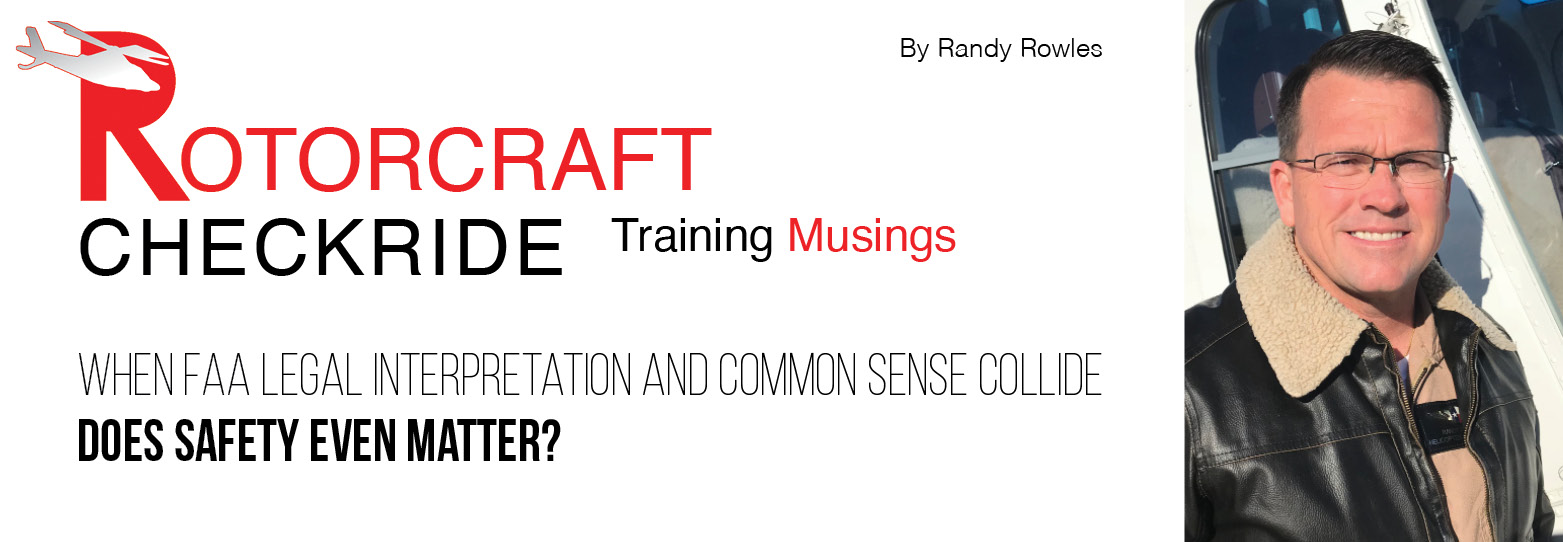|
Feb
15
2021
|
|
Posted 4 years 353 days ago ago by Admin
|
|

A commercial pilot student transferring to our pilot school provided training records that included a cross-country flight that met the requirements of 14 CFR 61.129(c)(3)(iii). It was a 2-hour cross country flight in a helicopter in nighttime conditions that consists of a total straight-line distance of more than 50 nautical miles from the original point of departure. However, it was conducted prior to his private pilot check ride. My initial response was that the flight time was unacceptable because it was pre-private and would not count toward commercial pilot requirements.
The commercial pilot student was prepared for this discussion, and immediately provided an FAA Legal interpretation (McLellan 2015) loosely based upon a similar situation. In the FAA’s Legal Interpretation, the agency clearly states that training received pre-private specifically provided to meet commercial pilot training requirements and logged accordingly is acceptable.
An excerpt from FAA McLellan 2015:
The training time logged to meet the commercial pilot requirements may all be counted towards the commercial pilot certificate, as long as the authorized instructor was training the pilot to the commercial pilot standards and recording that time in the logbook as training for a commercial certificate with a rotorcraft helicopter rating, as required by 14 CFR 61.51(h).
I must admit that I was surprised by this interpretation from the FAA. Then more and more revelations from the annals of FAA legal thought were presented, each with its own mechanism of circumventing training requirements thought to be common practice.
Some more examples are:
- Counting cross-country flight hours for a VFR certificate while flying with a view-limiting device to concurrently log instrument time.
- Logging required dual training for “Maneuvering Solely by Reference to the Instruments” with an instructor pilot that DOES NOT have an instrument rating on their flight Instructor certificate.
When queried, FAA Flight Standards deferred the topic back to FAA Legal. How does any of this benefit safety? The simple answer: it does not! FAA Legal interpretation takes the regulation as written and crafts FAA positions. In the words of FAA Legal staff, “If the regulation had been written correctly, there wouldn’t be an issue.”
The foundation for safe, efficient, and standardized pilot training is within the pilot certification process. The intent is to match the maneuvers required for the level of FAA certificate sought with the practical test standards (PTS) for that same level of certificate. This is easily identifiable by looking at the referenced regulation by FAA certificate level.
The maneuvers for helicopter certification of a private pilot are in accordance with 14 CFR 61.107(3). The required standards for those maneuvers are found in the Private Pilot PTS. The maneuvers for certification of a commercial pilot are in accordance with 14 CFR 61.127(3). The required standards for those maneuvers are found within the Commercial Pilot PTS.
For many years, it was common practice within FAA certification that when an applicant completed their private pilot certification, the training hours to apply for the next higher level of pilot certification would then begin. Based upon recent FAA Legal interpretations, this is not correct.
It is important to note that the pilot certification process does provide for the addition of certificates and ratings to existing FAA certificate holders. However, the process for such additional certificates and ratings are found within their own regulatory structure of 14 CFR 61.31 and 61.63.
Just because it is “legal” does not mean it is the right thing to do!
About Randy:
Randy Rowles has been a FAA pilot examiner for 20 years for all helicopter certificates and ratings. He holds a FAA Gold Seal Flight Instructor Certificate, NAFI Master Flight Instructor designation, and was the 2013 recipient of the HAI Flight Instructor of the Year Award. Rowles is the owner/president of Helicopter Institute.